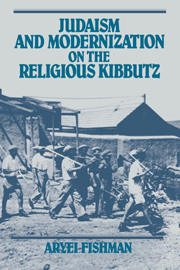Book contents
- Frontmatter
- Contents
- Preface
- Introduction
- PART ONE PROLOGUE
- PART TWO THE PARENT ORTHODOX MODERNIZING MOVEMENTS
- PART THREE THE RELIGIOUS KIBBUTZ MOVEMENT
- Afterword
- Appendix A The Religious Kibbutz Federation settlements
- Appendix B About the religious kibbutz members quoted in this book
- Appendix C Ideological periodicals referred to in book
- Notes
- Index
Afterword
Published online by Cambridge University Press: 29 October 2009
- Frontmatter
- Contents
- Preface
- Introduction
- PART ONE PROLOGUE
- PART TWO THE PARENT ORTHODOX MODERNIZING MOVEMENTS
- PART THREE THE RELIGIOUS KIBBUTZ MOVEMENT
- Afterword
- Appendix A The Religious Kibbutz Federation settlements
- Appendix B About the religious kibbutz members quoted in this book
- Appendix C Ideological periodicals referred to in book
- Notes
- Index
Summary
What is the nature of the religious impulses and thought that prevail within the Religious Kibbutz Federation at the outset of the 1990s, a generation or so after its original effervescent period? And what is the relationship between the RKF's innovative religious culture and its commitment, as part of Orthodox Judaism, to the mainstream religious tradition? Against the backdrop of the dimming of revolutionary ideology in Israel society at large, the attenuation of partisan boundaries within Israel's Orthodox Jewry, and the formation of a second and third generation within the RKF – the modulation of the RKF original religious ferment calls for separate study. Here I can no more than sketch the change in broad structural lines.
I indicated at the end of the last chapter that since the late 1950s the conservative component appears to prevail within the religious consciousness of the RKF and that the latter's bonds with Orthodox Jewry have tightened. The institutionalization of the role of rabbi in the Orthodox kibbutz – a process that began in the mid-1960s – is the salient expression of this development. In 1990 most RKF kibbutzim have their own rabbis, usually graduates of both Torah va-Avodah youth movements and Zionist yeshivot, who perform defined tasks such as the teaching of Torah.
- Type
- Chapter
- Information
- Judaism and Modernization on the Religious Kibbutz , pp. 158 - 159Publisher: Cambridge University PressPrint publication year: 1992



